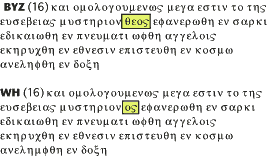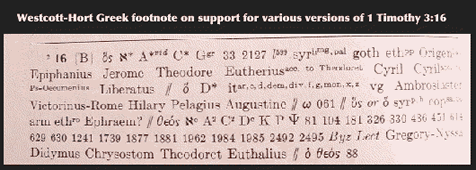
A Conspiracy Against the Word of God?
A look at the conspiracy accusation by KJV supporters against the modern Bible translations such as NIV, NASB and other versions.
The Bible's Challenge | Transformation | Canonization| Extent | Inspiration | Reliability | Relevance | VersionSome people have alleged that those who use other versions such as the NIV and NASB have given into a subtle attack against the literal Word of God. Those who make this claim affirm that the Word of God is preserved fully in the KJV and that those that support these 'modern' versions have given way to the adulteration of God's Word.
A brother recently wrote such a kind enquiry that I could not but answer his questions. This is the right spirit in which to seek the truth. He asked five textual translation problems in order to see whether there really is (was) a conspiracy (though he didn't say this). His questions are on the left; the answers are on the right.
(1) Luke 4:4
In the NIV the bold words are omitted. This one could be nit picky |
I believe the biggest question we need to face is whether there truly is a conspiracy against God's Word. If there was an attack, I believe it would be a consistent attack. In other words, we would see the same problem in parallel passages. We don't see this, though. Please note the parallel verse in Matthew 4:4. Matthew 4:4 We find that the parallel verse actually includes the debated words in Matthew 4:4. This shows that the translators thought Luke 4:4 was more accurate. Of course they could be wrong in their judgment but at least it is not because they are trying to alter the text. |
|
2) John 3:15
In the NIV the bold words are omitted and replaced with 'may'. This change seems serious! |
If there was a conspiracy to eliminate the concept of hell by erasing the word 'perish', then they would have taken the word out of the next verse (John 3:16) too! The meaning, no matter which way it is written, is still there. John 3:15 John 3:16 The real problem centers around whether there is a redundancy in the original text. The KJV (Byzantine Text - BYZ) prefers the longer text while those of the other theory (Westcott-Hort - WH) eliminate the few words when certain Greek manuscripts do not have them. They believe they were probably added in later. |
|
(3) 1 Timothy 3:16
In this one God is replaced with He. For the longest time I thought this verse referred to Jesus |
This is a bit more complicated but the issue is the same. The Westcott-Hort approach believes that the word "God" was added in. They go by the principle that the more unclear a text is the more correct it would be. In other words copyists purposely or inadvertently made slight adjustments to the text to make the sense clearer. Please note, they do not deny it refers to God. They just don't want to add anything to the original Greek text. There are many manuscripts that have the "Who" rather than "God." If there was a conspiracy, they would not have mentioned the support for the 'God' version. The BYZ stands for Byzantine Greek text (The KJV Received Text) while WH stands for Westcott-Hort (Basis for most modern texts). BYZ has 'theos' meaning 'God' while the WH has 'os' meaning 'whom.' There are many manuscripts that support each side. Which is true? A decision has to be made. |
|
My NASB has in the side column "Some later mss. read God." (mss = manuscripts). I wouldn't buy a personal Bible unless it had such notation. But for the sake of learning let us step into the world of Greek texts. Please go to the next question if you are not interested in the details. At the bottom of the Greek Bibles are detailed footnotes. Remember even these do not mention all the manuscripts that give support, but it does give us a good feeling for where things generally stand. Below is the detailed footnote from the Westcott-Hort Greek Bible.
Here are a few of the notations used in the beginning and their meaning. Although it all might look Greek, much of it is readable even without knowing Greek. Look carefully at the first notes. 16 | Refers to the verse 1 Timothy 3:16 which is written above in the Bible. In order to better understand the other notations, we have broken this footnote down into the following chart.
There is support for six different wordings. This is unusual. Most verses fully agree on all the words used. A little confusion, however, can cause great confusion. The two lines
(1) WH - os (who) The English or Greek letters are uncial manuscripts (capital letters). Most numbers represent miniscules (small letters -later manuscripts). syr, cop and vg stand for translations (Syrian, Coptic and Latin). The church fathers are listed after this with names like Origin and Augustine. Please remember this second chart has eliminated much information from the first to clarify the six readings. Use the full footnote to compare. You will see there are really only two major options: "Who" or "God." An extreme amount of research has gone into this work at a time when the original texts were not easily reached. The Byzantine Greek Bible has similar footnotes although it is presented a bit different. The argument as to which wording is the original is not so simple. The conspiracy overlooks support for both positions. Because of the multitude of texts, the translator must make some decisions on how to select which texts to use. This is the reason each side holds rather tenaciously to its principles of selection (such as 'more simple' (WH), 'less redundant' (WH), use of Byzantine texts (BYZ), etc.). You can see there is support for both sides. Until we unravel the problem a bit more, this tension will remain. KJV supporters need to understand that they themselves do what they accuse the other side of doing - excluding evidence. Personally I like "God" because it is clearer, but I am not sure that it was originally stated in this way. It is just like a lot of our songs that refer to God but do not say God. Poetry can be subtle. |
||
"In the NIV Joseph is replaced with 'his father'. Is this a big error?" |
It seems that you are suggesting that the NIV created a theological problem. It is not NIV's problem as much as a difficulty that arises from the many Greek manuscripts. Just as in the prior cases, there is support for both sides. Luke 2:33 There could have been a text copyist who thought, like you, that it was theologically vague and so he substituted Joseph. Technically speaking, Joseph was his father but not his biological father. Joseph had authority over him and that is why the angel appeared to him. Luke 2:40-41 says,
|
|
(5) Luke 11: 2-5And he said unto them, When ye pray, say, 'Our Father which art in heaven, Hallowed be thy name. Thy kingdom come. Thy will be done, as in heaven, so in earth. 3: Give us day by day our daily bread. 4: And forgive us our sins; for we also forgive every one that is indebted to us. And lead us not into temptation; but deliver us from evil. "The NIV omits all of the bold. Why would they decide to do that?" |
As above, there are various texts supporting the different sides. In this case you can see there was no conspiracy because the parallel passage in Matthew 6 does not exclude the key words. This is like question #1 above. Matthew 6:10 Matthew 6:14 |
|
But what about the reliability of those who did the work?
We should realize that many researchers and translators of the scriptures do not know the Lord and perhaps do not even believe in the Bible itself as God's Word. Some people just love research including many commentators. Those who support the KJV (Received Text) mention problems with the personal beliefs of Westcott and Hort. But there are also questions regarding Erasmus' own faith who gathered the manuscripts for the Received Text.
We need to go beyond this kind of argument or we will perhaps not use any English translation! After all, who translated the Hebrew scriptures into the Greek and formed the Septuagint (LXX)? We have absolutely no confidence that they feared the Lord. Jesus and other New Testament writers, however, used the Septuagint.
Should we not instead assert that if God can raise up an evil emperor like King Cyrus and call him His shepherd then we can trust God to raise up unbelievers at times to do work that benefits His people? I believe so.
"It is I who says of Cyrus, 'He is My shepherd! And he will perform all My desire.'" (Isaiah 44:28).
A SummaryWe find absolutely no proof of a conspiracy. If there was, it was the most poor job ever done!Instead we find answers that clarifies what the real issues are. Parallel texts give us an insight into what words editors have either added to or subtracted from the scriptures. WH believes the editors (copyists) added words while the Byzantine (KJV) supporters believe that they have taken them away. We are not sure who is right. Fortunately, we do know which few texts are in debate. A few of them were mentioned above.Despite these rendering problems, we can have full confidence in the scriptures themselves. There is no difference in meaning but perhaps only of clarity. No one is making up the text. There is support for both. The translators need to make a decision rather than leaving the choice up to the reader. As you can see it is a highly technical matter. Translation is not easy work.This conspiracy issue is used by the evil one to get people away from loving the word by distracting them into trivial arguments.Can we now get back to loving God through listening to His Word again?And if there are true and genuine questions, can we not be more like this brother who thought through his questions and kindly asked them? This helps all of us join hands in seeking God's truth even if we do come with different approaches. |
Knowing about God's Word and its reliability is one important matter, but one also needs to know how to meet God in the scriptures.
Other Articles on the Origin of the Bible Series |
|
1. How is the Bible different today from before? |
|
2. How did the Bible come into being? |
|
3. Why aren't other books part of the Bible? |
|
4. How is the Bible different from other books? |
|
5. Doesn't the Bible have a lot of mistakes? |
|
6. Is the Bible really relevant to my life? |
|
7. What Bible version should I use? I'm confused. |
|
8. Why do some people say that I must use the KJV? |
|
info@foundationsforfreedom.net
Scriptures typically quoted from the New American Standard Bible unless noted:
(C) Copyright The Lockman Foundation 1988













